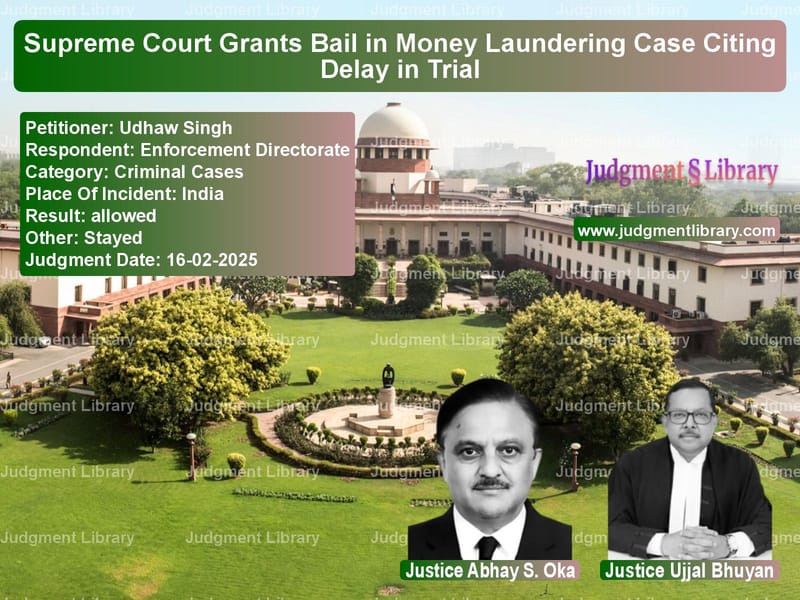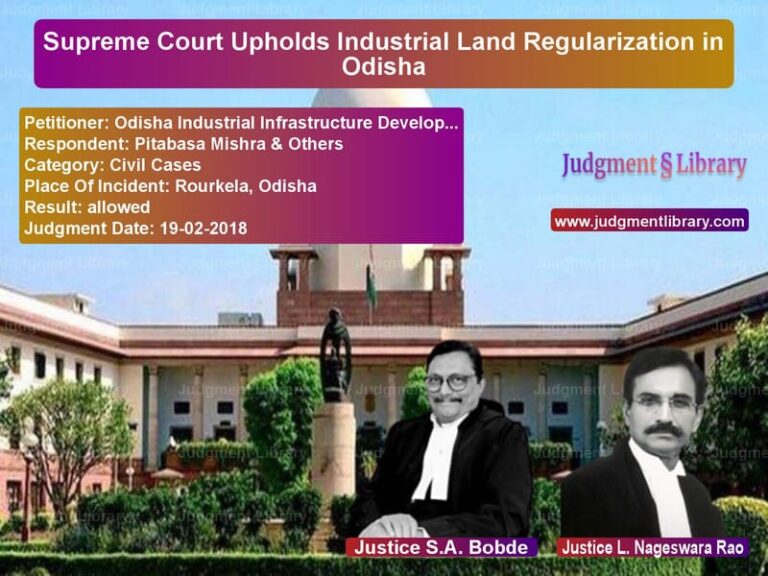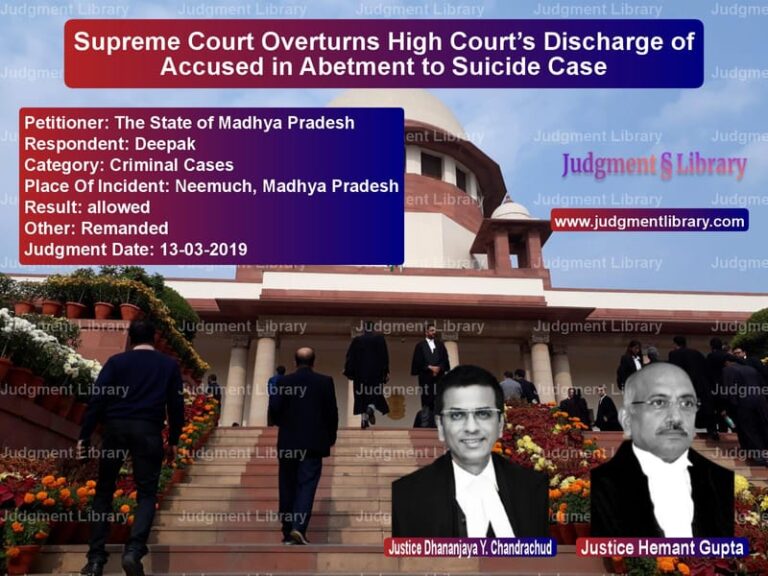Supreme Court Grants Bail in Money Laundering Case Citing Delay in Trial
The Supreme Court of India recently ruled in the case of Udhaw Singh v. Enforcement Directorate, where the appellant, who had been in custody for over a year, sought bail in a money laundering case under the Prevention of Money Laundering Act, 2002 (PMLA). The case highlights the issue of prolonged pre-trial detention and the right to a speedy trial under Article 21 of the Constitution.
Background of the Case
The appellant, Udhaw Singh, was arrested under Section 3 of the PMLA for allegedly being involved in a money laundering offense. He had been in judicial custody for one year and two months, with a total of 225 witnesses listed in the case, but only one witness had been examined at the time of the bail hearing. Given the complexity of the case, the trial was unlikely to conclude within a reasonable timeframe.
Legal Issues Raised
The main issues before the Supreme Court were:
- Whether continued incarceration of the accused without a foreseeable trial conclusion violates his right to a speedy trial under Article 21.
- Whether stringent bail conditions under Section 45 of the PMLA should be relaxed in cases of prolonged detention.
- Whether the appellant posed any flight risk or threat to the legal process.
Petitioner’s Arguments
The appellant’s counsel made the following submissions:
- The appellant had already spent over a year in jail, and given the number of witnesses, the trial was unlikely to conclude for several more years.
- Under the precedent set in V. Senthil Balaji v. Deputy Director, Directorate of Enforcement, an accused should not be detained indefinitely when the trial is unlikely to conclude in a reasonable time.
- Prolonged detention without trial amounted to a violation of Article 21 of the Constitution, which guarantees the right to life and liberty.
- There was no material evidence to suggest that the appellant would abscond or tamper with evidence.
Respondent’s Arguments
The Solicitor General, representing the Enforcement Directorate, countered with the following arguments:
- The allegations against the appellant were serious and involved large-scale financial transactions under the PMLA.
- Granting bail in money laundering cases requires satisfying the twin conditions under Section 45 of the PMLA.
- The trial process should be allowed to continue without external interference.
- However, the Solicitor General fairly admitted that, in light of past Supreme Court rulings, the Senthil Balaji precedent could apply to the case.
Supreme Court’s Observations
The Supreme Court, led by Justices Abhay S. Oka and Ujjal Bhuyan, extensively analyzed past judgments and considered the prolonged incarceration of the appellant. The Court made the following key observations:
“When the trial of the complaint under PMLA is likely to prolong beyond reasonable limits, the Constitutional Courts will have to consider exercising their powers to grant bail.”
“Section 45(1)(ii) does not confer power on the State to detain an accused for an unreasonably long time, especially when there is no possibility of trial concluding within a reasonable time.”
“If the Constitutional Courts do not exercise their jurisdiction in such cases, the rights of the undertrials under Article 21 of the Constitution of India will be defeated.”
The Court also referenced Union of India through Assistant Director v. Kanhaiya Prasad, where bail was revoked as the accused had spent less than seven months in custody. However, in that case, the trial was expected to conclude sooner, which distinguished it from the present case.
Final Judgment
The Supreme Court ruled in favor of the appellant and ordered the following:
- The appellant was granted bail, pending trial.
- He was to be produced before the Special Court within one week for bail conditions to be set.
- Strict conditions were imposed, including surrendering his passport and ensuring regular attendance in court.
Impact of the Judgment
This judgment reinforces the principle that:
- Prolonged detention without trial is unconstitutional, even under special laws like PMLA.
- Courts must balance the need for financial crime prosecution with fundamental rights.
- Bail should not be denied solely based on the gravity of the offense but should consider trial delays.
- Article 21’s right to a speedy trial remains a crucial factor in granting bail.
By granting bail in this case, the Supreme Court has reaffirmed the necessity of upholding constitutional rights, even in cases involving serious financial offenses.
Petitioner Name: Udhaw Singh.Respondent Name: Enforcement Directorate.Judgment By: Justice Abhay S. Oka, Justice Ujjal Bhuyan.Place Of Incident: India.Judgment Date: 16-02-2025.
Don’t miss out on the full details! Download the complete judgment in PDF format below and gain valuable insights instantly!
Download Judgment: udhaw-singh-vs-enforcement-director-supreme-court-of-india-judgment-dated-16-02-2025.pdf
Directly Download Judgment: Directly download this Judgment
See all petitions in Money Laundering Cases
See all petitions in Bail and Anticipatory Bail
See all petitions in Judgment by Abhay S. Oka
See all petitions in Judgment by Ujjal Bhuyan
See all petitions in allowed
See all petitions in Stayed
See all petitions in supreme court of India judgments February 2025
See all petitions in 2025 judgments
See all posts in Criminal Cases Category
See all allowed petitions in Criminal Cases Category
See all Dismissed petitions in Criminal Cases Category
See all partially allowed petitions in Criminal Cases Category







